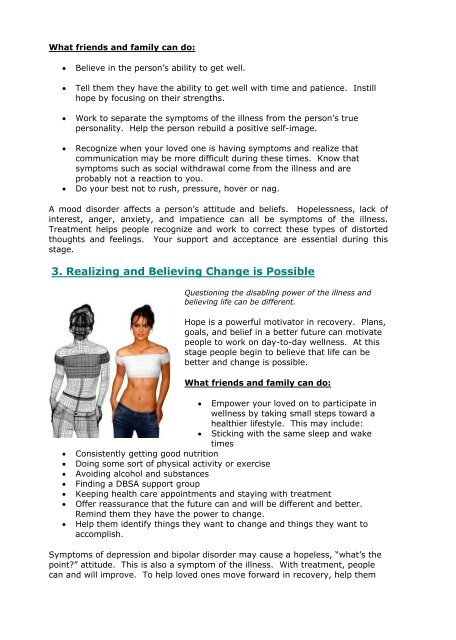personality disorders explained
Antisocial Personality Disorder, Codependence, Narcissism and Borderline
Antisocial Personality Disorder, Codependence, Narcissism and Borderline
You also want an ePaper? Increase the reach of your titles
YUMPU automatically turns print PDFs into web optimized ePapers that Google loves.
What friends and family can do:<br />
<br />
<br />
<br />
<br />
<br />
Believe in the person’s ability to get well.<br />
Tell them they have the ability to get well with time and patience. Instill<br />
hope by focusing on their strengths.<br />
Work to separate the symptoms of the illness from the person’s true<br />
<strong>personality</strong>. Help the person rebuild a positive self-image.<br />
Recognize when your loved one is having symptoms and realize that<br />
communication may be more difficult during these times. Know that<br />
symptoms such as social withdrawal come from the illness and are<br />
probably not a reaction to you.<br />
Do your best not to rush, pressure, hover or nag.<br />
A mood disorder affects a person’s attitude and beliefs. Hopelessness, lack of<br />
interest, anger, anxiety, and impatience can all be symptoms of the illness.<br />
Treatment helps people recognize and work to correct these types of distorted<br />
thoughts and feelings. Your support and acceptance are essential during this<br />
stage.<br />
3. Realizing and Believing Change is Possible<br />
Questioning the disabling power of the illness and<br />
believing life can be different.<br />
Hope is a powerful motivator in recovery. Plans,<br />
goals, and belief in a better future can motivate<br />
people to work on day-to-day wellness. At this<br />
stage people begin to believe that life can be<br />
better and change is possible.<br />
What friends and family can do:<br />
<br />
<br />
<br />
<br />
<br />
<br />
<br />
Empower your loved on to participate in<br />
wellness by taking small steps toward a<br />
healthier lifestyle. This may include:<br />
Sticking with the same sleep and wake<br />
times<br />
Consistently getting good nutrition<br />
Doing some sort of physical activity or exercise<br />
Avoiding alcohol and substances<br />
Finding a DBSA support group<br />
Keeping health care appointments and staying with treatment<br />
Offer reassurance that the future can and will be different and better.<br />
Remind them they have the power to change.<br />
Help them identify things they want to change and things they want to<br />
accomplish.<br />
Symptoms of depression and bipolar disorder may cause a hopeless, “what’s the<br />
point?” attitude. This is also a symptom of the illness. With treatment, people<br />
can and will improve. To help loved ones move forward in recovery, help them

















